Palliative Care: Evaluation and Legal Aspects of Aged Care Directives
VerifiedAdded on 2023/04/21
|14
|4592
|131
Essay
AI Summary
This essay provides an overview of palliative care, focusing on its evaluation in residential aged care facilities and a critical discussion of advanced care directives. It highlights the increasing demand for palliative care due to the rising life expectancy and the associated chronic disorders. The essay discusses the benefits of palliative care, including pain relief, improved quality of life, and support for families. It also examines the role of advanced care directives in ensuring that patients' end-of-life wishes are respected, addressing legal considerations and potential dilemmas that may arise in their implementation, such as conflicts between patient confidentiality and family involvement, and the need for healthcare professionals to navigate complex ethical and legal landscapes. Desklib offers a variety of study tools and resources, including past papers and solved assignments, to support students in their academic endeavors.
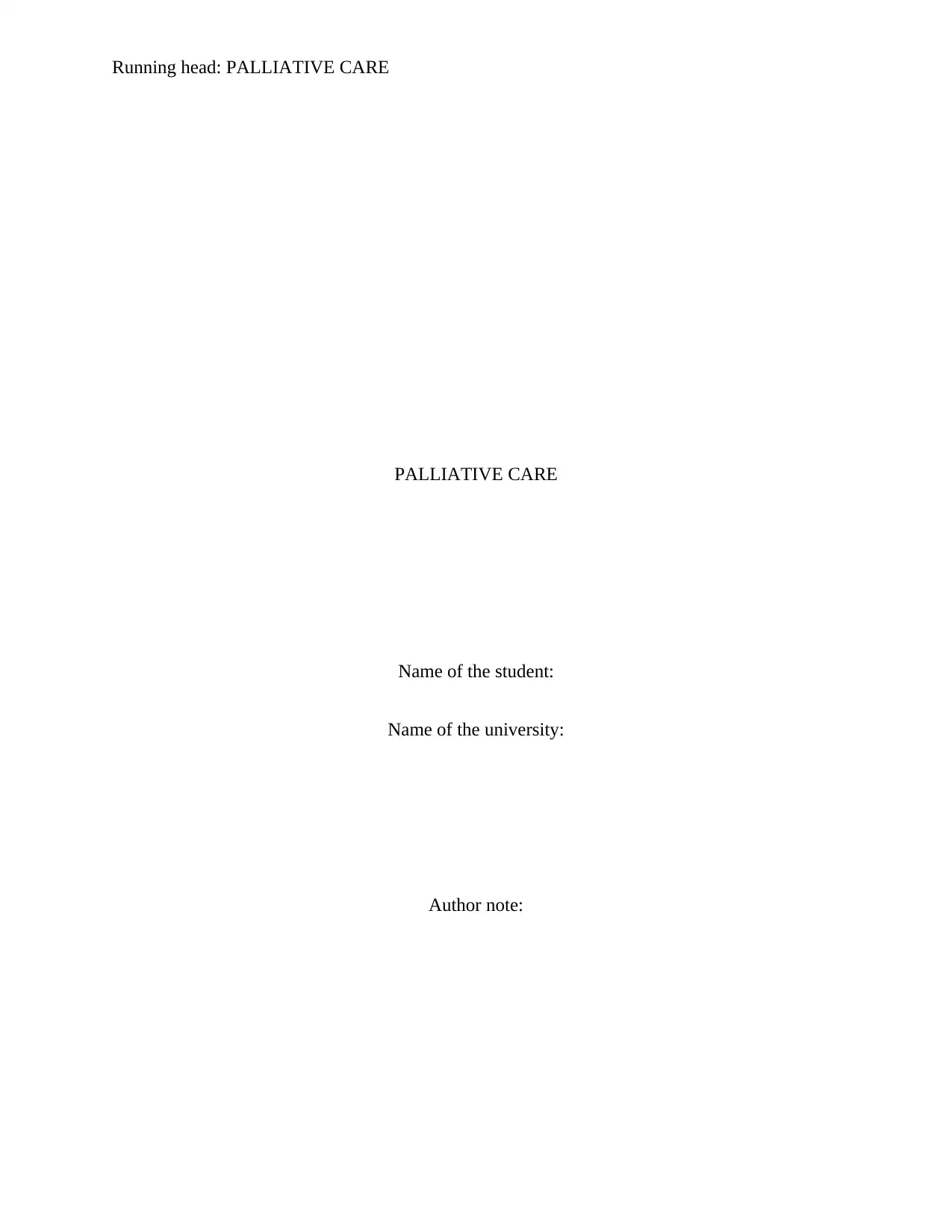
Running head: PALLIATIVE CARE
PALLIATIVE CARE
Name of the student:
Name of the university:
Author note:
PALLIATIVE CARE
Name of the student:
Name of the university:
Author note:
Paraphrase This Document
Need a fresh take? Get an instant paraphrase of this document with our AI Paraphraser
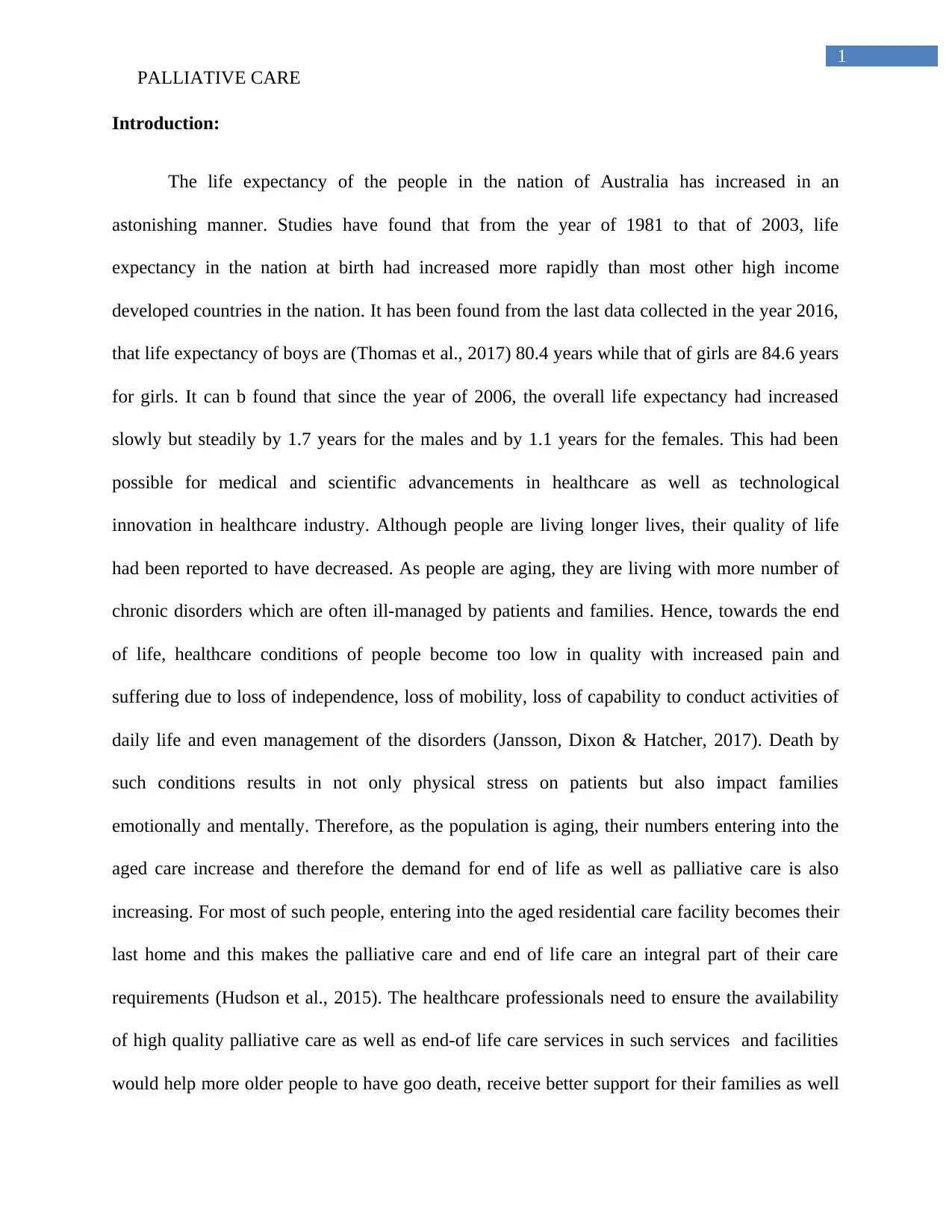
1
PALLIATIVE CARE
Introduction:
The life expectancy of the people in the nation of Australia has increased in an
astonishing manner. Studies have found that from the year of 1981 to that of 2003, life
expectancy in the nation at birth had increased more rapidly than most other high income
developed countries in the nation. It has been found from the last data collected in the year 2016,
that life expectancy of boys are (Thomas et al., 2017) 80.4 years while that of girls are 84.6 years
for girls. It can b found that since the year of 2006, the overall life expectancy had increased
slowly but steadily by 1.7 years for the males and by 1.1 years for the females. This had been
possible for medical and scientific advancements in healthcare as well as technological
innovation in healthcare industry. Although people are living longer lives, their quality of life
had been reported to have decreased. As people are aging, they are living with more number of
chronic disorders which are often ill-managed by patients and families. Hence, towards the end
of life, healthcare conditions of people become too low in quality with increased pain and
suffering due to loss of independence, loss of mobility, loss of capability to conduct activities of
daily life and even management of the disorders (Jansson, Dixon & Hatcher, 2017). Death by
such conditions results in not only physical stress on patients but also impact families
emotionally and mentally. Therefore, as the population is aging, their numbers entering into the
aged care increase and therefore the demand for end of life as well as palliative care is also
increasing. For most of such people, entering into the aged residential care facility becomes their
last home and this makes the palliative care and end of life care an integral part of their care
requirements (Hudson et al., 2015). The healthcare professionals need to ensure the availability
of high quality palliative care as well as end-of life care services in such services and facilities
would help more older people to have goo death, receive better support for their families as well
PALLIATIVE CARE
Introduction:
The life expectancy of the people in the nation of Australia has increased in an
astonishing manner. Studies have found that from the year of 1981 to that of 2003, life
expectancy in the nation at birth had increased more rapidly than most other high income
developed countries in the nation. It has been found from the last data collected in the year 2016,
that life expectancy of boys are (Thomas et al., 2017) 80.4 years while that of girls are 84.6 years
for girls. It can b found that since the year of 2006, the overall life expectancy had increased
slowly but steadily by 1.7 years for the males and by 1.1 years for the females. This had been
possible for medical and scientific advancements in healthcare as well as technological
innovation in healthcare industry. Although people are living longer lives, their quality of life
had been reported to have decreased. As people are aging, they are living with more number of
chronic disorders which are often ill-managed by patients and families. Hence, towards the end
of life, healthcare conditions of people become too low in quality with increased pain and
suffering due to loss of independence, loss of mobility, loss of capability to conduct activities of
daily life and even management of the disorders (Jansson, Dixon & Hatcher, 2017). Death by
such conditions results in not only physical stress on patients but also impact families
emotionally and mentally. Therefore, as the population is aging, their numbers entering into the
aged care increase and therefore the demand for end of life as well as palliative care is also
increasing. For most of such people, entering into the aged residential care facility becomes their
last home and this makes the palliative care and end of life care an integral part of their care
requirements (Hudson et al., 2015). The healthcare professionals need to ensure the availability
of high quality palliative care as well as end-of life care services in such services and facilities
would help more older people to have goo death, receive better support for their families as well
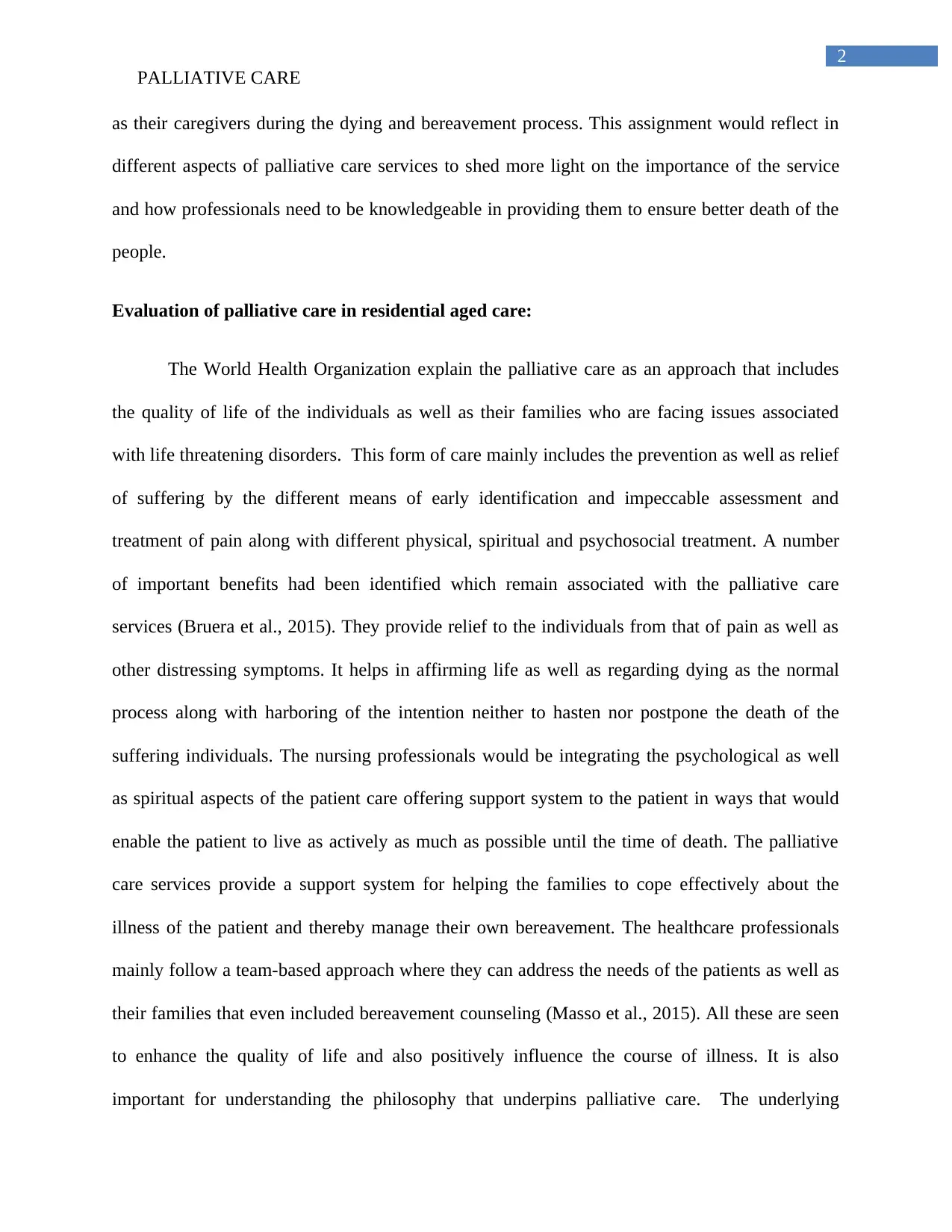
2
PALLIATIVE CARE
as their caregivers during the dying and bereavement process. This assignment would reflect in
different aspects of palliative care services to shed more light on the importance of the service
and how professionals need to be knowledgeable in providing them to ensure better death of the
people.
Evaluation of palliative care in residential aged care:
The World Health Organization explain the palliative care as an approach that includes
the quality of life of the individuals as well as their families who are facing issues associated
with life threatening disorders. This form of care mainly includes the prevention as well as relief
of suffering by the different means of early identification and impeccable assessment and
treatment of pain along with different physical, spiritual and psychosocial treatment. A number
of important benefits had been identified which remain associated with the palliative care
services (Bruera et al., 2015). They provide relief to the individuals from that of pain as well as
other distressing symptoms. It helps in affirming life as well as regarding dying as the normal
process along with harboring of the intention neither to hasten nor postpone the death of the
suffering individuals. The nursing professionals would be integrating the psychological as well
as spiritual aspects of the patient care offering support system to the patient in ways that would
enable the patient to live as actively as much as possible until the time of death. The palliative
care services provide a support system for helping the families to cope effectively about the
illness of the patient and thereby manage their own bereavement. The healthcare professionals
mainly follow a team-based approach where they can address the needs of the patients as well as
their families that even included bereavement counseling (Masso et al., 2015). All these are seen
to enhance the quality of life and also positively influence the course of illness. It is also
important for understanding the philosophy that underpins palliative care. The underlying
PALLIATIVE CARE
as their caregivers during the dying and bereavement process. This assignment would reflect in
different aspects of palliative care services to shed more light on the importance of the service
and how professionals need to be knowledgeable in providing them to ensure better death of the
people.
Evaluation of palliative care in residential aged care:
The World Health Organization explain the palliative care as an approach that includes
the quality of life of the individuals as well as their families who are facing issues associated
with life threatening disorders. This form of care mainly includes the prevention as well as relief
of suffering by the different means of early identification and impeccable assessment and
treatment of pain along with different physical, spiritual and psychosocial treatment. A number
of important benefits had been identified which remain associated with the palliative care
services (Bruera et al., 2015). They provide relief to the individuals from that of pain as well as
other distressing symptoms. It helps in affirming life as well as regarding dying as the normal
process along with harboring of the intention neither to hasten nor postpone the death of the
suffering individuals. The nursing professionals would be integrating the psychological as well
as spiritual aspects of the patient care offering support system to the patient in ways that would
enable the patient to live as actively as much as possible until the time of death. The palliative
care services provide a support system for helping the families to cope effectively about the
illness of the patient and thereby manage their own bereavement. The healthcare professionals
mainly follow a team-based approach where they can address the needs of the patients as well as
their families that even included bereavement counseling (Masso et al., 2015). All these are seen
to enhance the quality of life and also positively influence the course of illness. It is also
important for understanding the philosophy that underpins palliative care. The underlying
⊘ This is a preview!⊘
Do you want full access?
Subscribe today to unlock all pages.

Trusted by 1+ million students worldwide
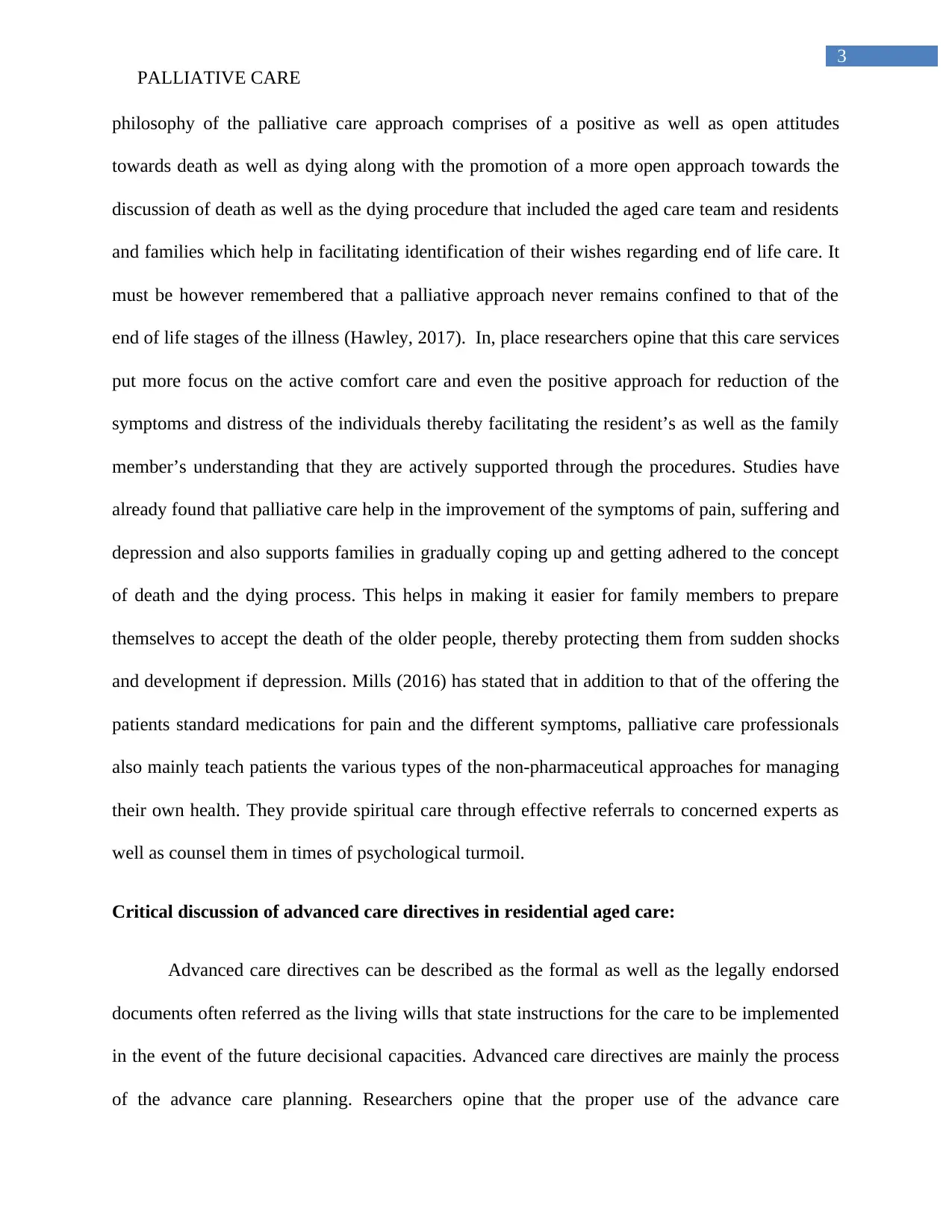
3
PALLIATIVE CARE
philosophy of the palliative care approach comprises of a positive as well as open attitudes
towards death as well as dying along with the promotion of a more open approach towards the
discussion of death as well as the dying procedure that included the aged care team and residents
and families which help in facilitating identification of their wishes regarding end of life care. It
must be however remembered that a palliative approach never remains confined to that of the
end of life stages of the illness (Hawley, 2017). In, place researchers opine that this care services
put more focus on the active comfort care and even the positive approach for reduction of the
symptoms and distress of the individuals thereby facilitating the resident’s as well as the family
member’s understanding that they are actively supported through the procedures. Studies have
already found that palliative care help in the improvement of the symptoms of pain, suffering and
depression and also supports families in gradually coping up and getting adhered to the concept
of death and the dying process. This helps in making it easier for family members to prepare
themselves to accept the death of the older people, thereby protecting them from sudden shocks
and development if depression. Mills (2016) has stated that in addition to that of the offering the
patients standard medications for pain and the different symptoms, palliative care professionals
also mainly teach patients the various types of the non-pharmaceutical approaches for managing
their own health. They provide spiritual care through effective referrals to concerned experts as
well as counsel them in times of psychological turmoil.
Critical discussion of advanced care directives in residential aged care:
Advanced care directives can be described as the formal as well as the legally endorsed
documents often referred as the living wills that state instructions for the care to be implemented
in the event of the future decisional capacities. Advanced care directives are mainly the process
of the advance care planning. Researchers opine that the proper use of the advance care
PALLIATIVE CARE
philosophy of the palliative care approach comprises of a positive as well as open attitudes
towards death as well as dying along with the promotion of a more open approach towards the
discussion of death as well as the dying procedure that included the aged care team and residents
and families which help in facilitating identification of their wishes regarding end of life care. It
must be however remembered that a palliative approach never remains confined to that of the
end of life stages of the illness (Hawley, 2017). In, place researchers opine that this care services
put more focus on the active comfort care and even the positive approach for reduction of the
symptoms and distress of the individuals thereby facilitating the resident’s as well as the family
member’s understanding that they are actively supported through the procedures. Studies have
already found that palliative care help in the improvement of the symptoms of pain, suffering and
depression and also supports families in gradually coping up and getting adhered to the concept
of death and the dying process. This helps in making it easier for family members to prepare
themselves to accept the death of the older people, thereby protecting them from sudden shocks
and development if depression. Mills (2016) has stated that in addition to that of the offering the
patients standard medications for pain and the different symptoms, palliative care professionals
also mainly teach patients the various types of the non-pharmaceutical approaches for managing
their own health. They provide spiritual care through effective referrals to concerned experts as
well as counsel them in times of psychological turmoil.
Critical discussion of advanced care directives in residential aged care:
Advanced care directives can be described as the formal as well as the legally endorsed
documents often referred as the living wills that state instructions for the care to be implemented
in the event of the future decisional capacities. Advanced care directives are mainly the process
of the advance care planning. Researchers opine that the proper use of the advance care
Paraphrase This Document
Need a fresh take? Get an instant paraphrase of this document with our AI Paraphraser
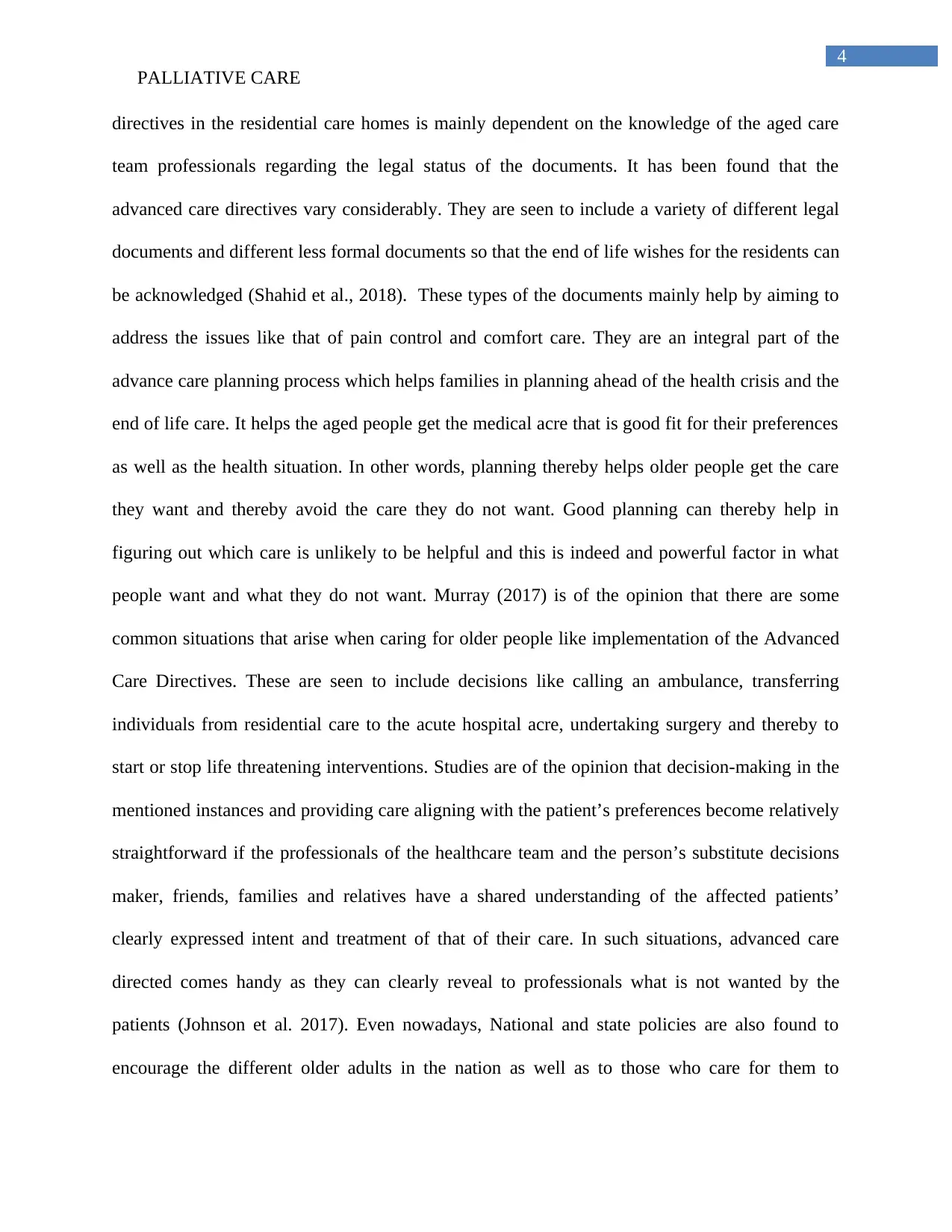
4
PALLIATIVE CARE
directives in the residential care homes is mainly dependent on the knowledge of the aged care
team professionals regarding the legal status of the documents. It has been found that the
advanced care directives vary considerably. They are seen to include a variety of different legal
documents and different less formal documents so that the end of life wishes for the residents can
be acknowledged (Shahid et al., 2018). These types of the documents mainly help by aiming to
address the issues like that of pain control and comfort care. They are an integral part of the
advance care planning process which helps families in planning ahead of the health crisis and the
end of life care. It helps the aged people get the medical acre that is good fit for their preferences
as well as the health situation. In other words, planning thereby helps older people get the care
they want and thereby avoid the care they do not want. Good planning can thereby help in
figuring out which care is unlikely to be helpful and this is indeed and powerful factor in what
people want and what they do not want. Murray (2017) is of the opinion that there are some
common situations that arise when caring for older people like implementation of the Advanced
Care Directives. These are seen to include decisions like calling an ambulance, transferring
individuals from residential care to the acute hospital acre, undertaking surgery and thereby to
start or stop life threatening interventions. Studies are of the opinion that decision-making in the
mentioned instances and providing care aligning with the patient’s preferences become relatively
straightforward if the professionals of the healthcare team and the person’s substitute decisions
maker, friends, families and relatives have a shared understanding of the affected patients’
clearly expressed intent and treatment of that of their care. In such situations, advanced care
directed comes handy as they can clearly reveal to professionals what is not wanted by the
patients (Johnson et al. 2017). Even nowadays, National and state policies are also found to
encourage the different older adults in the nation as well as to those who care for them to
PALLIATIVE CARE
directives in the residential care homes is mainly dependent on the knowledge of the aged care
team professionals regarding the legal status of the documents. It has been found that the
advanced care directives vary considerably. They are seen to include a variety of different legal
documents and different less formal documents so that the end of life wishes for the residents can
be acknowledged (Shahid et al., 2018). These types of the documents mainly help by aiming to
address the issues like that of pain control and comfort care. They are an integral part of the
advance care planning process which helps families in planning ahead of the health crisis and the
end of life care. It helps the aged people get the medical acre that is good fit for their preferences
as well as the health situation. In other words, planning thereby helps older people get the care
they want and thereby avoid the care they do not want. Good planning can thereby help in
figuring out which care is unlikely to be helpful and this is indeed and powerful factor in what
people want and what they do not want. Murray (2017) is of the opinion that there are some
common situations that arise when caring for older people like implementation of the Advanced
Care Directives. These are seen to include decisions like calling an ambulance, transferring
individuals from residential care to the acute hospital acre, undertaking surgery and thereby to
start or stop life threatening interventions. Studies are of the opinion that decision-making in the
mentioned instances and providing care aligning with the patient’s preferences become relatively
straightforward if the professionals of the healthcare team and the person’s substitute decisions
maker, friends, families and relatives have a shared understanding of the affected patients’
clearly expressed intent and treatment of that of their care. In such situations, advanced care
directed comes handy as they can clearly reveal to professionals what is not wanted by the
patients (Johnson et al. 2017). Even nowadays, National and state policies are also found to
encourage the different older adults in the nation as well as to those who care for them to
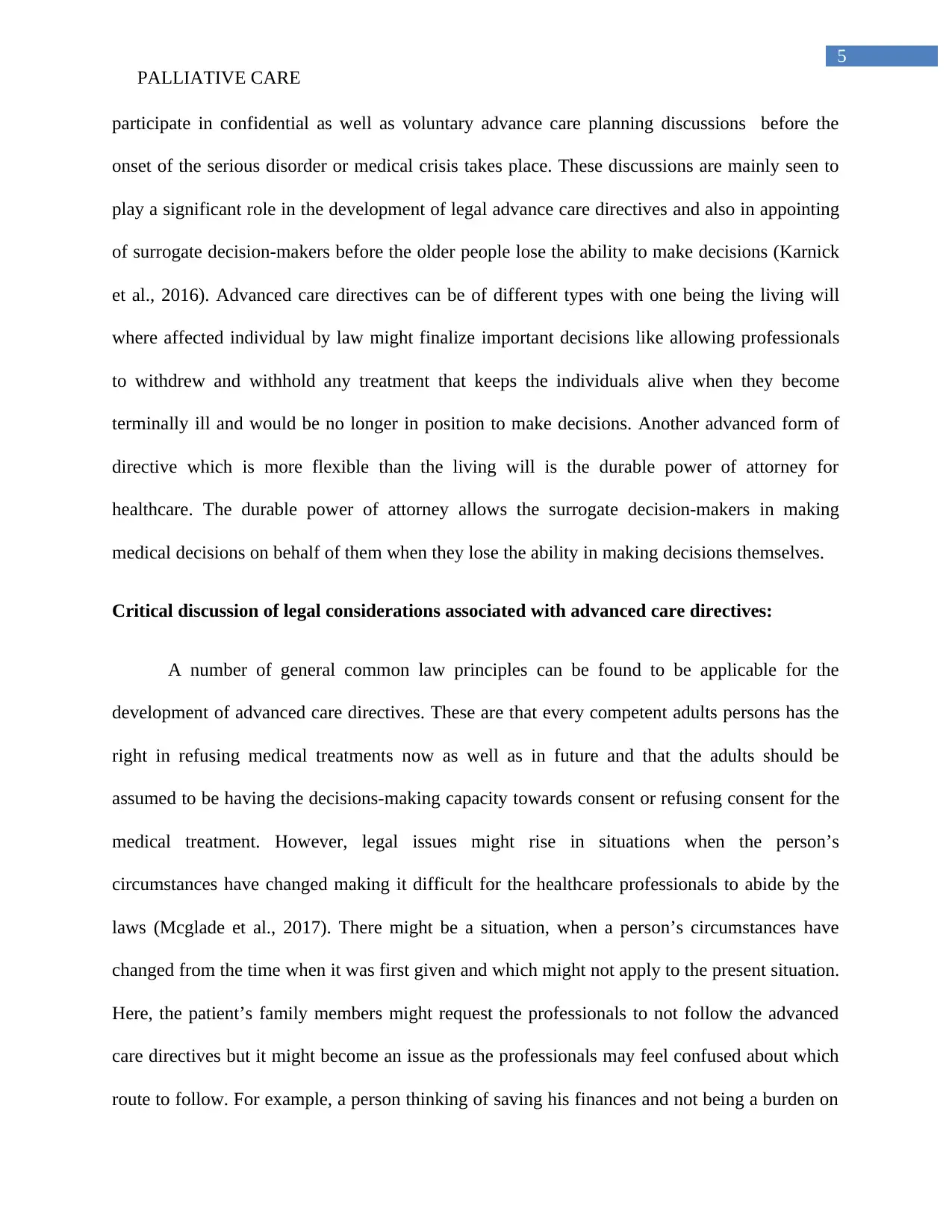
5
PALLIATIVE CARE
participate in confidential as well as voluntary advance care planning discussions before the
onset of the serious disorder or medical crisis takes place. These discussions are mainly seen to
play a significant role in the development of legal advance care directives and also in appointing
of surrogate decision-makers before the older people lose the ability to make decisions (Karnick
et al., 2016). Advanced care directives can be of different types with one being the living will
where affected individual by law might finalize important decisions like allowing professionals
to withdrew and withhold any treatment that keeps the individuals alive when they become
terminally ill and would be no longer in position to make decisions. Another advanced form of
directive which is more flexible than the living will is the durable power of attorney for
healthcare. The durable power of attorney allows the surrogate decision-makers in making
medical decisions on behalf of them when they lose the ability in making decisions themselves.
Critical discussion of legal considerations associated with advanced care directives:
A number of general common law principles can be found to be applicable for the
development of advanced care directives. These are that every competent adults persons has the
right in refusing medical treatments now as well as in future and that the adults should be
assumed to be having the decisions-making capacity towards consent or refusing consent for the
medical treatment. However, legal issues might rise in situations when the person’s
circumstances have changed making it difficult for the healthcare professionals to abide by the
laws (Mcglade et al., 2017). There might be a situation, when a person’s circumstances have
changed from the time when it was first given and which might not apply to the present situation.
Here, the patient’s family members might request the professionals to not follow the advanced
care directives but it might become an issue as the professionals may feel confused about which
route to follow. For example, a person thinking of saving his finances and not being a burden on
PALLIATIVE CARE
participate in confidential as well as voluntary advance care planning discussions before the
onset of the serious disorder or medical crisis takes place. These discussions are mainly seen to
play a significant role in the development of legal advance care directives and also in appointing
of surrogate decision-makers before the older people lose the ability to make decisions (Karnick
et al., 2016). Advanced care directives can be of different types with one being the living will
where affected individual by law might finalize important decisions like allowing professionals
to withdrew and withhold any treatment that keeps the individuals alive when they become
terminally ill and would be no longer in position to make decisions. Another advanced form of
directive which is more flexible than the living will is the durable power of attorney for
healthcare. The durable power of attorney allows the surrogate decision-makers in making
medical decisions on behalf of them when they lose the ability in making decisions themselves.
Critical discussion of legal considerations associated with advanced care directives:
A number of general common law principles can be found to be applicable for the
development of advanced care directives. These are that every competent adults persons has the
right in refusing medical treatments now as well as in future and that the adults should be
assumed to be having the decisions-making capacity towards consent or refusing consent for the
medical treatment. However, legal issues might rise in situations when the person’s
circumstances have changed making it difficult for the healthcare professionals to abide by the
laws (Mcglade et al., 2017). There might be a situation, when a person’s circumstances have
changed from the time when it was first given and which might not apply to the present situation.
Here, the patient’s family members might request the professionals to not follow the advanced
care directives but it might become an issue as the professionals may feel confused about which
route to follow. For example, a person thinking of saving his finances and not being a burden on
⊘ This is a preview!⊘
Do you want full access?
Subscribe today to unlock all pages.

Trusted by 1+ million students worldwide
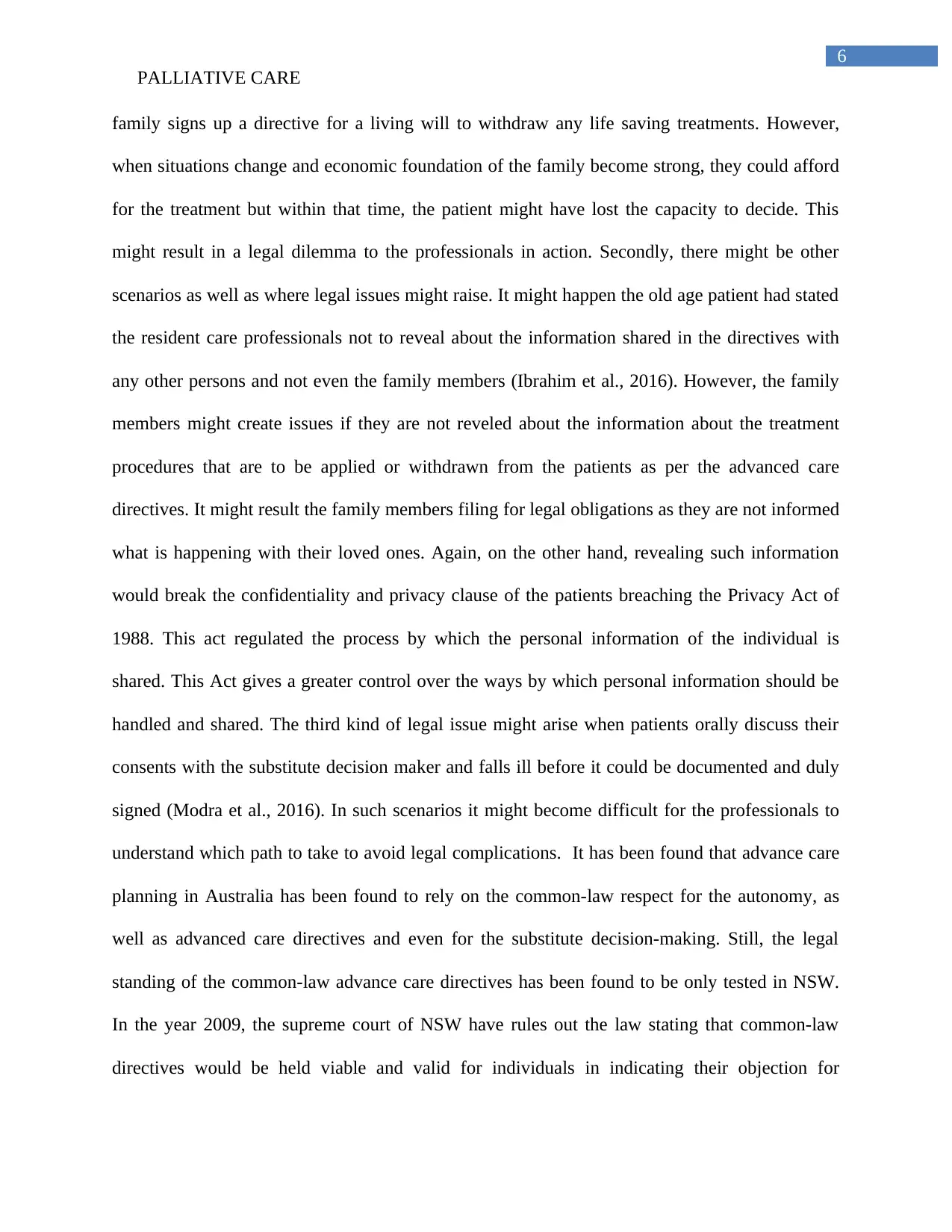
6
PALLIATIVE CARE
family signs up a directive for a living will to withdraw any life saving treatments. However,
when situations change and economic foundation of the family become strong, they could afford
for the treatment but within that time, the patient might have lost the capacity to decide. This
might result in a legal dilemma to the professionals in action. Secondly, there might be other
scenarios as well as where legal issues might raise. It might happen the old age patient had stated
the resident care professionals not to reveal about the information shared in the directives with
any other persons and not even the family members (Ibrahim et al., 2016). However, the family
members might create issues if they are not reveled about the information about the treatment
procedures that are to be applied or withdrawn from the patients as per the advanced care
directives. It might result the family members filing for legal obligations as they are not informed
what is happening with their loved ones. Again, on the other hand, revealing such information
would break the confidentiality and privacy clause of the patients breaching the Privacy Act of
1988. This act regulated the process by which the personal information of the individual is
shared. This Act gives a greater control over the ways by which personal information should be
handled and shared. The third kind of legal issue might arise when patients orally discuss their
consents with the substitute decision maker and falls ill before it could be documented and duly
signed (Modra et al., 2016). In such scenarios it might become difficult for the professionals to
understand which path to take to avoid legal complications. It has been found that advance care
planning in Australia has been found to rely on the common-law respect for the autonomy, as
well as advanced care directives and even for the substitute decision-making. Still, the legal
standing of the common-law advance care directives has been found to be only tested in NSW.
In the year 2009, the supreme court of NSW have rules out the law stating that common-law
directives would be held viable and valid for individuals in indicating their objection for
PALLIATIVE CARE
family signs up a directive for a living will to withdraw any life saving treatments. However,
when situations change and economic foundation of the family become strong, they could afford
for the treatment but within that time, the patient might have lost the capacity to decide. This
might result in a legal dilemma to the professionals in action. Secondly, there might be other
scenarios as well as where legal issues might raise. It might happen the old age patient had stated
the resident care professionals not to reveal about the information shared in the directives with
any other persons and not even the family members (Ibrahim et al., 2016). However, the family
members might create issues if they are not reveled about the information about the treatment
procedures that are to be applied or withdrawn from the patients as per the advanced care
directives. It might result the family members filing for legal obligations as they are not informed
what is happening with their loved ones. Again, on the other hand, revealing such information
would break the confidentiality and privacy clause of the patients breaching the Privacy Act of
1988. This act regulated the process by which the personal information of the individual is
shared. This Act gives a greater control over the ways by which personal information should be
handled and shared. The third kind of legal issue might arise when patients orally discuss their
consents with the substitute decision maker and falls ill before it could be documented and duly
signed (Modra et al., 2016). In such scenarios it might become difficult for the professionals to
understand which path to take to avoid legal complications. It has been found that advance care
planning in Australia has been found to rely on the common-law respect for the autonomy, as
well as advanced care directives and even for the substitute decision-making. Still, the legal
standing of the common-law advance care directives has been found to be only tested in NSW.
In the year 2009, the supreme court of NSW have rules out the law stating that common-law
directives would be held viable and valid for individuals in indicating their objection for
Paraphrase This Document
Need a fresh take? Get an instant paraphrase of this document with our AI Paraphraser
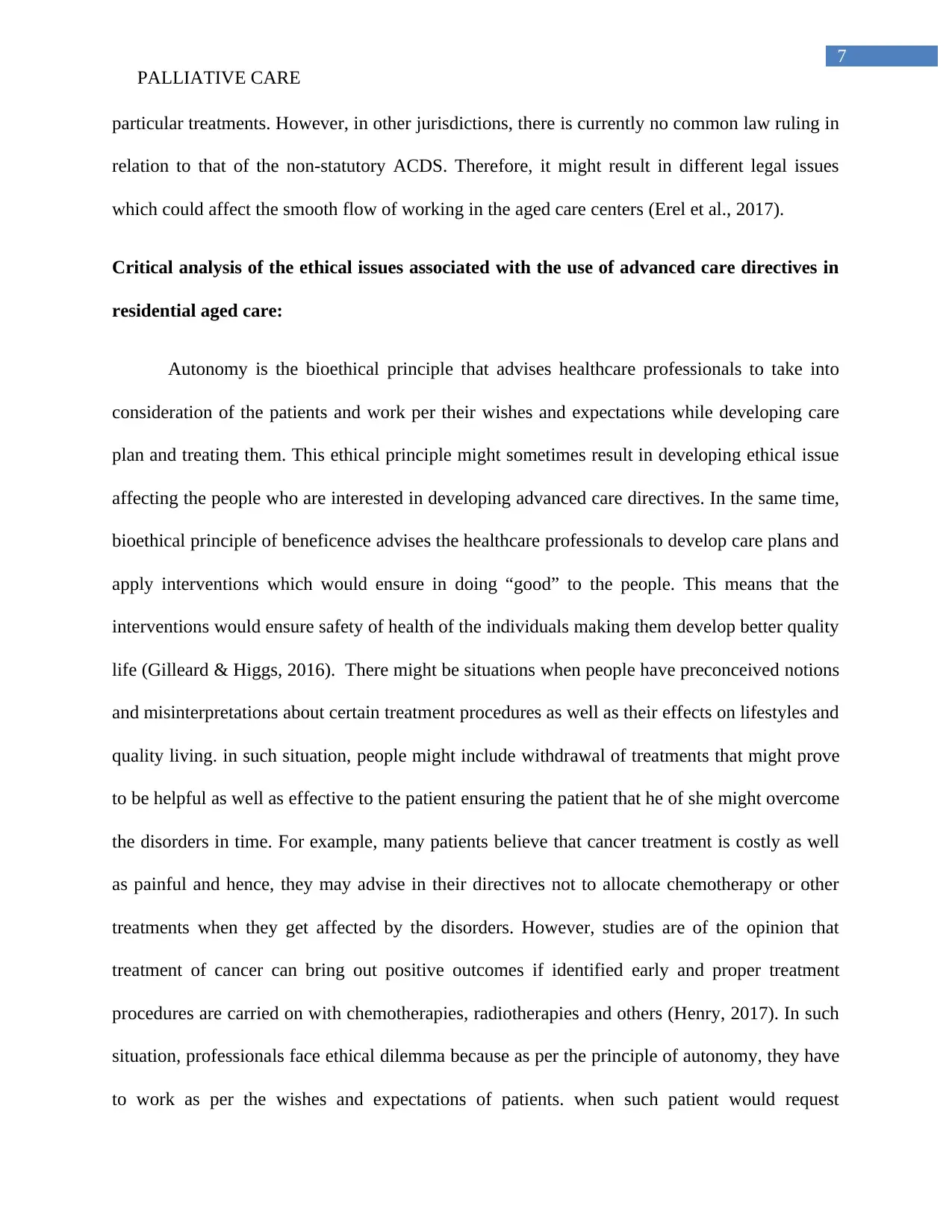
7
PALLIATIVE CARE
particular treatments. However, in other jurisdictions, there is currently no common law ruling in
relation to that of the non-statutory ACDS. Therefore, it might result in different legal issues
which could affect the smooth flow of working in the aged care centers (Erel et al., 2017).
Critical analysis of the ethical issues associated with the use of advanced care directives in
residential aged care:
Autonomy is the bioethical principle that advises healthcare professionals to take into
consideration of the patients and work per their wishes and expectations while developing care
plan and treating them. This ethical principle might sometimes result in developing ethical issue
affecting the people who are interested in developing advanced care directives. In the same time,
bioethical principle of beneficence advises the healthcare professionals to develop care plans and
apply interventions which would ensure in doing “good” to the people. This means that the
interventions would ensure safety of health of the individuals making them develop better quality
life (Gilleard & Higgs, 2016). There might be situations when people have preconceived notions
and misinterpretations about certain treatment procedures as well as their effects on lifestyles and
quality living. in such situation, people might include withdrawal of treatments that might prove
to be helpful as well as effective to the patient ensuring the patient that he of she might overcome
the disorders in time. For example, many patients believe that cancer treatment is costly as well
as painful and hence, they may advise in their directives not to allocate chemotherapy or other
treatments when they get affected by the disorders. However, studies are of the opinion that
treatment of cancer can bring out positive outcomes if identified early and proper treatment
procedures are carried on with chemotherapies, radiotherapies and others (Henry, 2017). In such
situation, professionals face ethical dilemma because as per the principle of autonomy, they have
to work as per the wishes and expectations of patients. when such patient would request
PALLIATIVE CARE
particular treatments. However, in other jurisdictions, there is currently no common law ruling in
relation to that of the non-statutory ACDS. Therefore, it might result in different legal issues
which could affect the smooth flow of working in the aged care centers (Erel et al., 2017).
Critical analysis of the ethical issues associated with the use of advanced care directives in
residential aged care:
Autonomy is the bioethical principle that advises healthcare professionals to take into
consideration of the patients and work per their wishes and expectations while developing care
plan and treating them. This ethical principle might sometimes result in developing ethical issue
affecting the people who are interested in developing advanced care directives. In the same time,
bioethical principle of beneficence advises the healthcare professionals to develop care plans and
apply interventions which would ensure in doing “good” to the people. This means that the
interventions would ensure safety of health of the individuals making them develop better quality
life (Gilleard & Higgs, 2016). There might be situations when people have preconceived notions
and misinterpretations about certain treatment procedures as well as their effects on lifestyles and
quality living. in such situation, people might include withdrawal of treatments that might prove
to be helpful as well as effective to the patient ensuring the patient that he of she might overcome
the disorders in time. For example, many patients believe that cancer treatment is costly as well
as painful and hence, they may advise in their directives not to allocate chemotherapy or other
treatments when they get affected by the disorders. However, studies are of the opinion that
treatment of cancer can bring out positive outcomes if identified early and proper treatment
procedures are carried on with chemotherapies, radiotherapies and others (Henry, 2017). In such
situation, professionals face ethical dilemma because as per the principle of autonomy, they have
to work as per the wishes and expectations of patients. when such patient would request
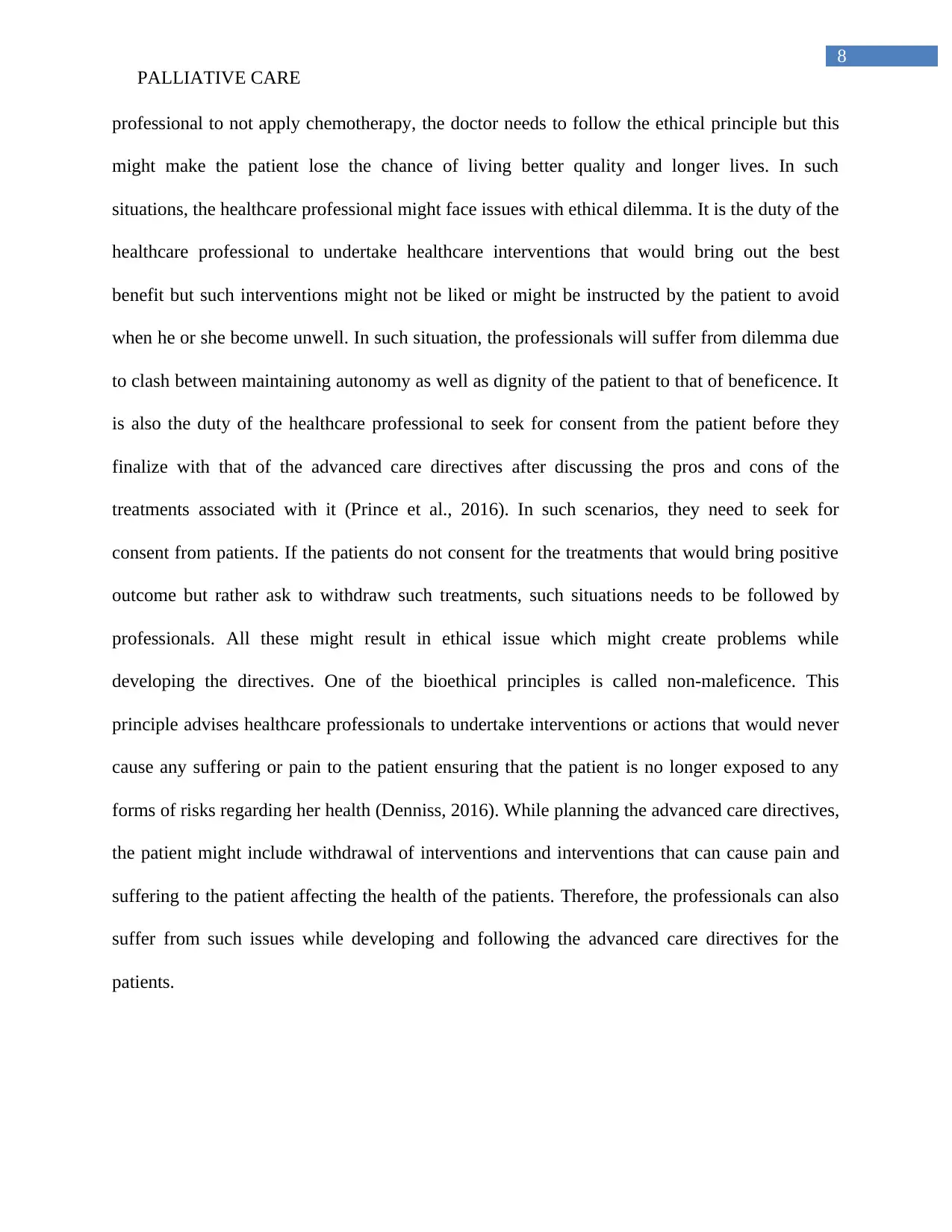
8
PALLIATIVE CARE
professional to not apply chemotherapy, the doctor needs to follow the ethical principle but this
might make the patient lose the chance of living better quality and longer lives. In such
situations, the healthcare professional might face issues with ethical dilemma. It is the duty of the
healthcare professional to undertake healthcare interventions that would bring out the best
benefit but such interventions might not be liked or might be instructed by the patient to avoid
when he or she become unwell. In such situation, the professionals will suffer from dilemma due
to clash between maintaining autonomy as well as dignity of the patient to that of beneficence. It
is also the duty of the healthcare professional to seek for consent from the patient before they
finalize with that of the advanced care directives after discussing the pros and cons of the
treatments associated with it (Prince et al., 2016). In such scenarios, they need to seek for
consent from patients. If the patients do not consent for the treatments that would bring positive
outcome but rather ask to withdraw such treatments, such situations needs to be followed by
professionals. All these might result in ethical issue which might create problems while
developing the directives. One of the bioethical principles is called non-maleficence. This
principle advises healthcare professionals to undertake interventions or actions that would never
cause any suffering or pain to the patient ensuring that the patient is no longer exposed to any
forms of risks regarding her health (Denniss, 2016). While planning the advanced care directives,
the patient might include withdrawal of interventions and interventions that can cause pain and
suffering to the patient affecting the health of the patients. Therefore, the professionals can also
suffer from such issues while developing and following the advanced care directives for the
patients.
PALLIATIVE CARE
professional to not apply chemotherapy, the doctor needs to follow the ethical principle but this
might make the patient lose the chance of living better quality and longer lives. In such
situations, the healthcare professional might face issues with ethical dilemma. It is the duty of the
healthcare professional to undertake healthcare interventions that would bring out the best
benefit but such interventions might not be liked or might be instructed by the patient to avoid
when he or she become unwell. In such situation, the professionals will suffer from dilemma due
to clash between maintaining autonomy as well as dignity of the patient to that of beneficence. It
is also the duty of the healthcare professional to seek for consent from the patient before they
finalize with that of the advanced care directives after discussing the pros and cons of the
treatments associated with it (Prince et al., 2016). In such scenarios, they need to seek for
consent from patients. If the patients do not consent for the treatments that would bring positive
outcome but rather ask to withdraw such treatments, such situations needs to be followed by
professionals. All these might result in ethical issue which might create problems while
developing the directives. One of the bioethical principles is called non-maleficence. This
principle advises healthcare professionals to undertake interventions or actions that would never
cause any suffering or pain to the patient ensuring that the patient is no longer exposed to any
forms of risks regarding her health (Denniss, 2016). While planning the advanced care directives,
the patient might include withdrawal of interventions and interventions that can cause pain and
suffering to the patient affecting the health of the patients. Therefore, the professionals can also
suffer from such issues while developing and following the advanced care directives for the
patients.
⊘ This is a preview!⊘
Do you want full access?
Subscribe today to unlock all pages.

Trusted by 1+ million students worldwide
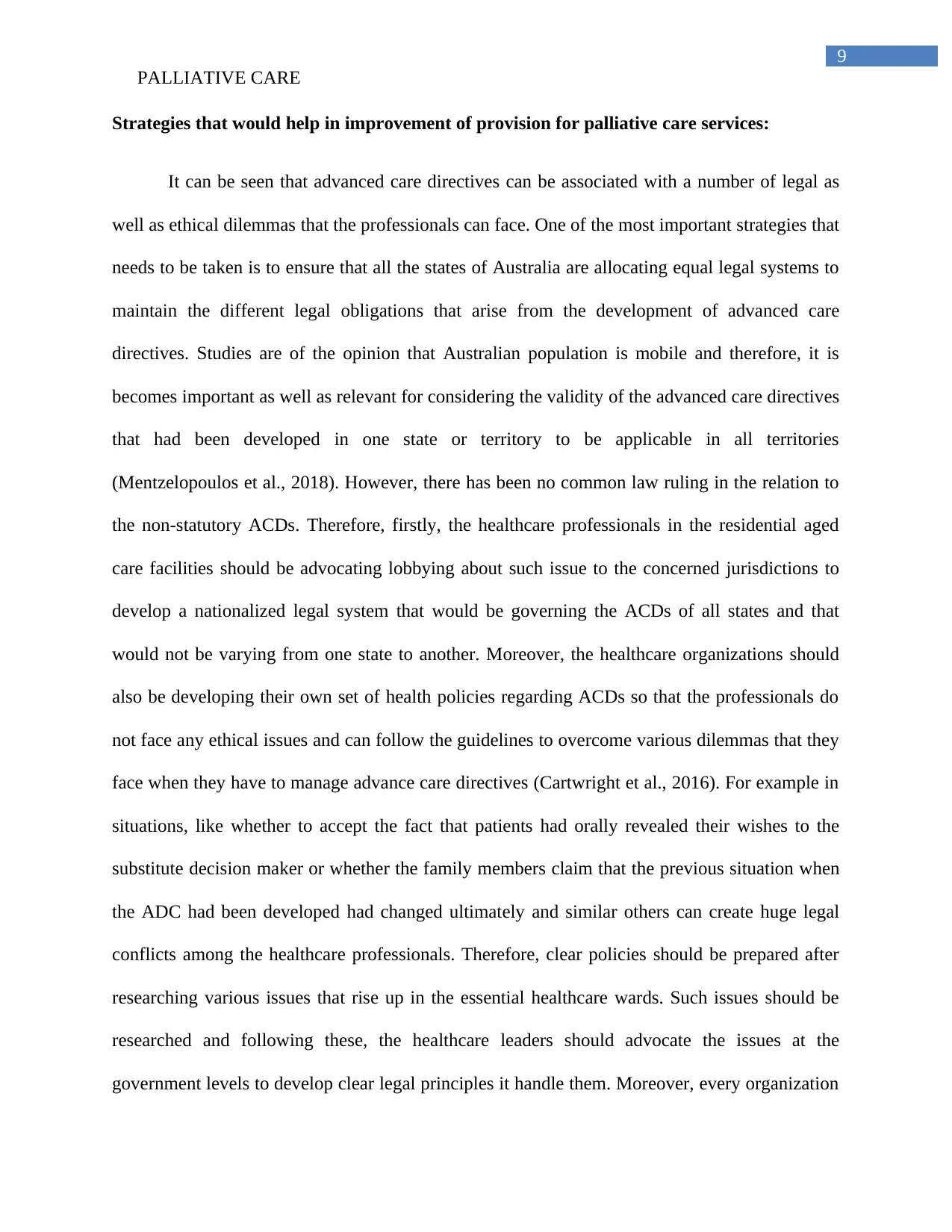
9
PALLIATIVE CARE
Strategies that would help in improvement of provision for palliative care services:
It can be seen that advanced care directives can be associated with a number of legal as
well as ethical dilemmas that the professionals can face. One of the most important strategies that
needs to be taken is to ensure that all the states of Australia are allocating equal legal systems to
maintain the different legal obligations that arise from the development of advanced care
directives. Studies are of the opinion that Australian population is mobile and therefore, it is
becomes important as well as relevant for considering the validity of the advanced care directives
that had been developed in one state or territory to be applicable in all territories
(Mentzelopoulos et al., 2018). However, there has been no common law ruling in the relation to
the non-statutory ACDs. Therefore, firstly, the healthcare professionals in the residential aged
care facilities should be advocating lobbying about such issue to the concerned jurisdictions to
develop a nationalized legal system that would be governing the ACDs of all states and that
would not be varying from one state to another. Moreover, the healthcare organizations should
also be developing their own set of health policies regarding ACDs so that the professionals do
not face any ethical issues and can follow the guidelines to overcome various dilemmas that they
face when they have to manage advance care directives (Cartwright et al., 2016). For example in
situations, like whether to accept the fact that patients had orally revealed their wishes to the
substitute decision maker or whether the family members claim that the previous situation when
the ADC had been developed had changed ultimately and similar others can create huge legal
conflicts among the healthcare professionals. Therefore, clear policies should be prepared after
researching various issues that rise up in the essential healthcare wards. Such issues should be
researched and following these, the healthcare leaders should advocate the issues at the
government levels to develop clear legal principles it handle them. Moreover, every organization
PALLIATIVE CARE
Strategies that would help in improvement of provision for palliative care services:
It can be seen that advanced care directives can be associated with a number of legal as
well as ethical dilemmas that the professionals can face. One of the most important strategies that
needs to be taken is to ensure that all the states of Australia are allocating equal legal systems to
maintain the different legal obligations that arise from the development of advanced care
directives. Studies are of the opinion that Australian population is mobile and therefore, it is
becomes important as well as relevant for considering the validity of the advanced care directives
that had been developed in one state or territory to be applicable in all territories
(Mentzelopoulos et al., 2018). However, there has been no common law ruling in the relation to
the non-statutory ACDs. Therefore, firstly, the healthcare professionals in the residential aged
care facilities should be advocating lobbying about such issue to the concerned jurisdictions to
develop a nationalized legal system that would be governing the ACDs of all states and that
would not be varying from one state to another. Moreover, the healthcare organizations should
also be developing their own set of health policies regarding ACDs so that the professionals do
not face any ethical issues and can follow the guidelines to overcome various dilemmas that they
face when they have to manage advance care directives (Cartwright et al., 2016). For example in
situations, like whether to accept the fact that patients had orally revealed their wishes to the
substitute decision maker or whether the family members claim that the previous situation when
the ADC had been developed had changed ultimately and similar others can create huge legal
conflicts among the healthcare professionals. Therefore, clear policies should be prepared after
researching various issues that rise up in the essential healthcare wards. Such issues should be
researched and following these, the healthcare leaders should advocate the issues at the
government levels to develop clear legal principles it handle them. Moreover, every organization
Paraphrase This Document
Need a fresh take? Get an instant paraphrase of this document with our AI Paraphraser
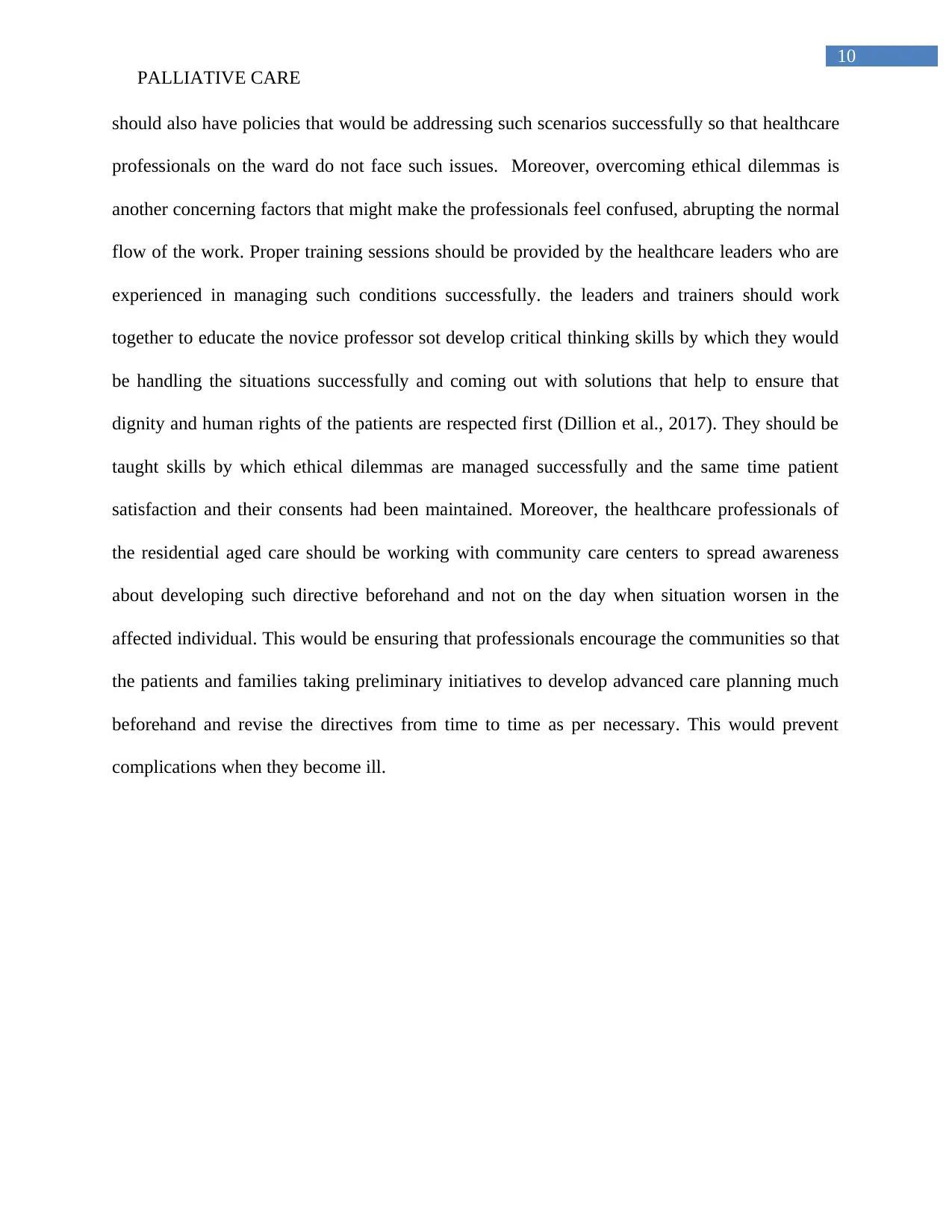
10
PALLIATIVE CARE
should also have policies that would be addressing such scenarios successfully so that healthcare
professionals on the ward do not face such issues. Moreover, overcoming ethical dilemmas is
another concerning factors that might make the professionals feel confused, abrupting the normal
flow of the work. Proper training sessions should be provided by the healthcare leaders who are
experienced in managing such conditions successfully. the leaders and trainers should work
together to educate the novice professor sot develop critical thinking skills by which they would
be handling the situations successfully and coming out with solutions that help to ensure that
dignity and human rights of the patients are respected first (Dillion et al., 2017). They should be
taught skills by which ethical dilemmas are managed successfully and the same time patient
satisfaction and their consents had been maintained. Moreover, the healthcare professionals of
the residential aged care should be working with community care centers to spread awareness
about developing such directive beforehand and not on the day when situation worsen in the
affected individual. This would be ensuring that professionals encourage the communities so that
the patients and families taking preliminary initiatives to develop advanced care planning much
beforehand and revise the directives from time to time as per necessary. This would prevent
complications when they become ill.
PALLIATIVE CARE
should also have policies that would be addressing such scenarios successfully so that healthcare
professionals on the ward do not face such issues. Moreover, overcoming ethical dilemmas is
another concerning factors that might make the professionals feel confused, abrupting the normal
flow of the work. Proper training sessions should be provided by the healthcare leaders who are
experienced in managing such conditions successfully. the leaders and trainers should work
together to educate the novice professor sot develop critical thinking skills by which they would
be handling the situations successfully and coming out with solutions that help to ensure that
dignity and human rights of the patients are respected first (Dillion et al., 2017). They should be
taught skills by which ethical dilemmas are managed successfully and the same time patient
satisfaction and their consents had been maintained. Moreover, the healthcare professionals of
the residential aged care should be working with community care centers to spread awareness
about developing such directive beforehand and not on the day when situation worsen in the
affected individual. This would be ensuring that professionals encourage the communities so that
the patients and families taking preliminary initiatives to develop advanced care planning much
beforehand and revise the directives from time to time as per necessary. This would prevent
complications when they become ill.
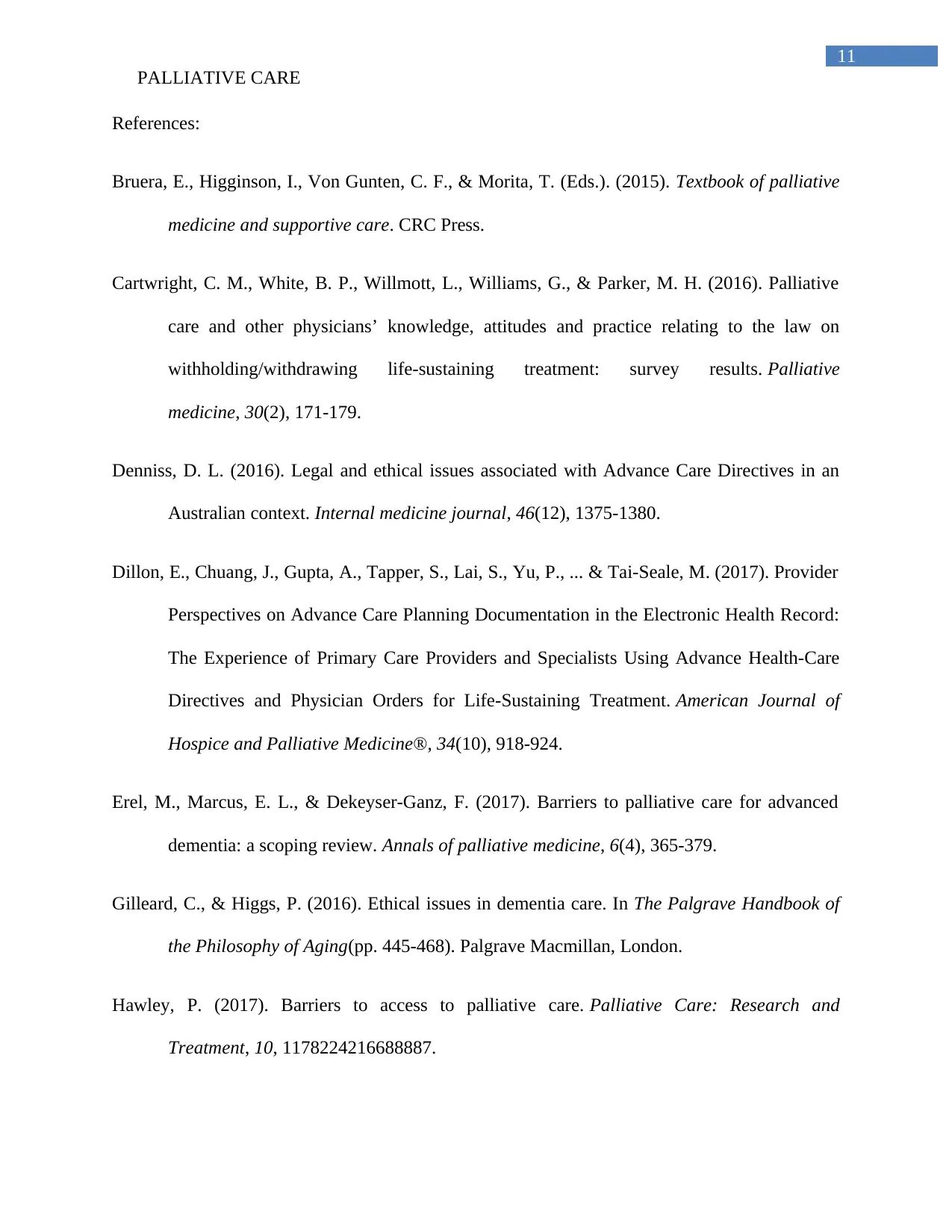
11
PALLIATIVE CARE
References:
Bruera, E., Higginson, I., Von Gunten, C. F., & Morita, T. (Eds.). (2015). Textbook of palliative
medicine and supportive care. CRC Press.
Cartwright, C. M., White, B. P., Willmott, L., Williams, G., & Parker, M. H. (2016). Palliative
care and other physicians’ knowledge, attitudes and practice relating to the law on
withholding/withdrawing life-sustaining treatment: survey results. Palliative
medicine, 30(2), 171-179.
Denniss, D. L. (2016). Legal and ethical issues associated with Advance Care Directives in an
Australian context. Internal medicine journal, 46(12), 1375-1380.
Dillon, E., Chuang, J., Gupta, A., Tapper, S., Lai, S., Yu, P., ... & Tai-Seale, M. (2017). Provider
Perspectives on Advance Care Planning Documentation in the Electronic Health Record:
The Experience of Primary Care Providers and Specialists Using Advance Health-Care
Directives and Physician Orders for Life-Sustaining Treatment. American Journal of
Hospice and Palliative Medicine®, 34(10), 918-924.
Erel, M., Marcus, E. L., & Dekeyser-Ganz, F. (2017). Barriers to palliative care for advanced
dementia: a scoping review. Annals of palliative medicine, 6(4), 365-379.
Gilleard, C., & Higgs, P. (2016). Ethical issues in dementia care. In The Palgrave Handbook of
the Philosophy of Aging(pp. 445-468). Palgrave Macmillan, London.
Hawley, P. (2017). Barriers to access to palliative care. Palliative Care: Research and
Treatment, 10, 1178224216688887.
PALLIATIVE CARE
References:
Bruera, E., Higginson, I., Von Gunten, C. F., & Morita, T. (Eds.). (2015). Textbook of palliative
medicine and supportive care. CRC Press.
Cartwright, C. M., White, B. P., Willmott, L., Williams, G., & Parker, M. H. (2016). Palliative
care and other physicians’ knowledge, attitudes and practice relating to the law on
withholding/withdrawing life-sustaining treatment: survey results. Palliative
medicine, 30(2), 171-179.
Denniss, D. L. (2016). Legal and ethical issues associated with Advance Care Directives in an
Australian context. Internal medicine journal, 46(12), 1375-1380.
Dillon, E., Chuang, J., Gupta, A., Tapper, S., Lai, S., Yu, P., ... & Tai-Seale, M. (2017). Provider
Perspectives on Advance Care Planning Documentation in the Electronic Health Record:
The Experience of Primary Care Providers and Specialists Using Advance Health-Care
Directives and Physician Orders for Life-Sustaining Treatment. American Journal of
Hospice and Palliative Medicine®, 34(10), 918-924.
Erel, M., Marcus, E. L., & Dekeyser-Ganz, F. (2017). Barriers to palliative care for advanced
dementia: a scoping review. Annals of palliative medicine, 6(4), 365-379.
Gilleard, C., & Higgs, P. (2016). Ethical issues in dementia care. In The Palgrave Handbook of
the Philosophy of Aging(pp. 445-468). Palgrave Macmillan, London.
Hawley, P. (2017). Barriers to access to palliative care. Palliative Care: Research and
Treatment, 10, 1178224216688887.
⊘ This is a preview!⊘
Do you want full access?
Subscribe today to unlock all pages.

Trusted by 1+ million students worldwide
1 out of 14
Related Documents
Your All-in-One AI-Powered Toolkit for Academic Success.
+13062052269
info@desklib.com
Available 24*7 on WhatsApp / Email
![[object Object]](/_next/static/media/star-bottom.7253800d.svg)
Unlock your academic potential
Copyright © 2020–2026 A2Z Services. All Rights Reserved. Developed and managed by ZUCOL.





